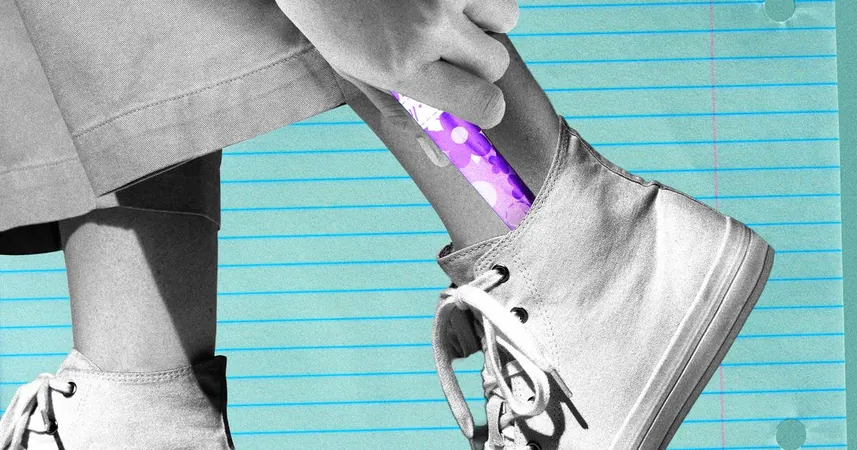
The Hidden Crises: Are Backpack Bans Making School Days a Nightmare for Teen Girls?
2024-10-08
Author: Lok
It was just 10:30 a.m. when Emma, a 13-year-old from suburban Tennessee, faced a harrowing crisis at her school. "I literally hate my life so much," she texted her mother in desperation after realizing she had bled through her pad during class. With no access to extra menstrual products due to stringent backpack bans, Emma's predicament escalated when she discovered blood on her seat. The frantic search for supplies led her to a friend's stash, averting a total disaster. "I feel like I’m in the frickin' wild,” she lamented, highlighting the sheer indignity teens endure during their periods.
In response to the alarming increase in gun violence, many schools have imposed bans on backpacks to enhance security. While some cite preventing weapon concealment as a justification, critics argue that these restrictions compromise students' health, particularly for young women. With reports showing that a backpack ban hasn’t proven effective in preventing tragedies, the question arises: why enforce policies that have such detrimental effects on personal health?
Emma isn't alone. Many menstruating students now find themselves scrambling to carry hygiene products discreetly. The stigma attached to menstruation often exacerbates existing challenges, as many young girls feel embarrassed asking for pads or tampons from teachers or school nurses. While some schools are providing options for menstrual supplies, the solutions offered are often insufficient. Emma and her peers often resort to creative—and sometimes unsettling—methods to transport their necessary items.
The backpack ban has unnerved Kristi Roe-Owen, a mother who voiced her concerns after her daughter, Elle, faced a similar crisis in Tulsa, Oklahoma. "It's just another lazy policy that inadvertently treats women as second-class citizens," she declared in a blog. Encouraging her daughter to find alternatives for carrying supplies, Roe-Owen has incorporated cloth pouches into Elle's wardrobe, yet the nagging fear of forgetting pads looms large. The fact remains that many teens are left fending for themselves, with some, like Elle, stating they would rather endure the potential of being bullied than openly ask for help.
The awkwardness surrounding menstruation is palpable. Many teens are horrified at the idea of discussing their periods with male teachers or staff. Emerson, another student, recalls the embarrassment of being put on the spot by a teacher when she simply wanted to excuse herself. "It was a very awkward situation," she admitted, pointing to the stigma associated with such natural occurrences.
Innovative solutions from students and parents flood social media platforms, showcasing items like period underwear and scrunchies that can discreetly hold tampons. Maysa, a 13-year-old from Portland, even reported friends hiding menstrual products in their high-top sneakers—a sobering reflection of the lengths students will go to circumvent the discomfort.
The absence of reliable access to menstrual supplies can have serious health implications. As evidenced by Maysa's experience, the quality and availability of items in school bathrooms often falls short. "I opted to bleed through a pair of new jeans rather than use what was on offer," she says, laying bare the harsh reality many face.
Despite the discomfort, many students remain resilient, creating makeshift strategies. The pressures of time constraints between classes further complicate swift access to supplies. Emma mentioned being penalized for lingering too long in the hallway, which adds to her anxiety. Even discreetly changing a pad in a stall becomes an exercise in public embarrassment as younger students jokingly comment on periods.
Teachers themselves are feeling the impact of strict policies. Katarina, an English teacher, shared her frustration over the inability to adequately assist her students, suggesting that a locker filled with menstrual supplies would be a sensible solution. Unfortunately, such rational proposals are often met with resistance due to fears of misuse.
Roe-Owen continues to advocate for her daughter’s school to reconsider the backpack ban, recognizing the obvious solution to repeal the policy entirely. If students had the freedom to carry their belongings and supplies, schools could foster a more supportive environment for all students, especially young women.
Meanwhile, Emma longs for high school, where she envisions carrying her backpack freely and having her period essentials at hand. "I could never go back," she says, a sentiment echoing the feelings of countless young girls who navigate these challenging months. The combined struggles of adolescence and period management should not be exacerbated by school policies that ignore the basic needs of students.
As awareness grows, it becomes imperative for schools to reassess these mandates and prioritize the health and well-being of all students—after all, a supportive learning environment is conducive to success.




 Brasil (PT)
Brasil (PT)
 Canada (EN)
Canada (EN)
 Chile (ES)
Chile (ES)
 España (ES)
España (ES)
 France (FR)
France (FR)
 Hong Kong (EN)
Hong Kong (EN)
 Italia (IT)
Italia (IT)
 日本 (JA)
日本 (JA)
 Magyarország (HU)
Magyarország (HU)
 Norge (NO)
Norge (NO)
 Polska (PL)
Polska (PL)
 Schweiz (DE)
Schweiz (DE)
 Singapore (EN)
Singapore (EN)
 Sverige (SV)
Sverige (SV)
 Suomi (FI)
Suomi (FI)
 Türkiye (TR)
Türkiye (TR)